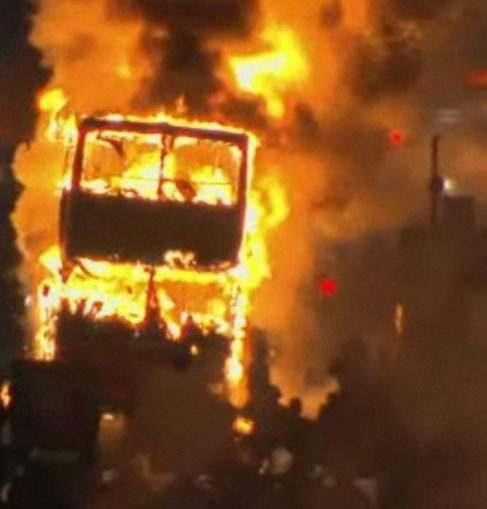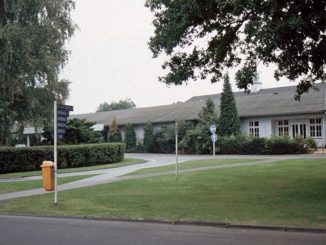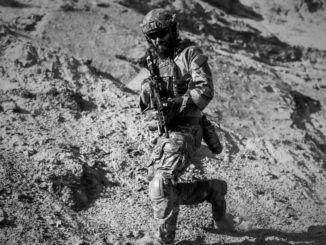
Chapter 39 – Epilogue Two
Former Detective Inspector Charles Hope became a very successful novelist. He wrote scathingly satirical comedy novels about the police service, which won him few friends among serving officers and the Police Federation, but a huge following among former officers who had seen and had enough, and the general public who had been involved with dealings with the police and for whom it was all too realistic. He even wrote under the nom de plume ‘Forlorn Hope’ to rub the noses of the Thames Valley Police in it.
When the situation in the Home Counties became intolerable, Hope moved with his family to Shropshire and bought a country house for cash. He is still visited by a member of the Inkspots every six months and they catch up. Like all of them, Hope remained unmolested by the Security Services, who by then had far more pressing issues to deal with.
* * *
Major Gardner left the Army after a full career, having discovered there was a glass ceiling for those of his background. But mainly, he preferred soldiering and command and leadership to the politics of the headquarters and staff officers. He never made colonel but was respected and liked within his battalion, and his colonel stopped pestering him to go on and complete the Intermediate Staff Studies Course.
Ironically, although he detested politics within the Army, Gardner stood as a member for parliament as an independent. The sitting Tory MP was a noted expense fiddler and general trougher, and her Labour rival was a known Momentum and Union plant. Much to his amazement, Gardner was elected to the Mother of all Parliaments and became very quickly disillusioned and frustrated. The only realistic means an individual MP had of making a difference was to be elected onto one of the select committees, and as an independent, Gardner had no chance, due to the death grip of the party system and the whips, who maintained a system of status quo and mediocrity. Gardner served one term and didn’t stand for re-election.
It was the actions of the ruling class that made civil insurrection inevitable. The betrayal of a legitimate and legal referendum vote to leave the EU and the clampdown on free speech inflamed a normally docile and compliant population. The zombie Labour Government proved to be incapable of governing and the previous summer’s ‘Race Riots’ in northern town and cities, and the reaction to them, caused a powder keg of resentment to explode. When the police actively supported the rape gangs, the anger of the indigenous population was directed against them and it knew no bounds. In one shocking incident, a riot van was isolated and ambushed in Leeds and the nine police inside were slaughtered, bludgeoned to death, and the bodies hung for display at Elland Road football ground.
It was a sickening act that shocked the world, but the feeble government’s attempts to crack down on the rioters backfired, and insurrection broke out in all major towns and cities throughout the country. Many Army units refused to obey orders. Given the mass prosecutions of military personnel for ‘historic war crimes’, who could blame them? And this insurrection wasn’t rioting to loot in a spasm of anger and greed, the ‘Insurrection’ was well coordinated and led, and it became obvious that some key units had received special training in urban warfare. Britain had become ungovernable and quasi-independent areas were set up in the South, the West Country, East Anglia, Cumbria and the Northern Marches. Most of the major cities were ungovernable hellholes of crime and lawlessness.
When what the zombie government called the ‘Insurgency’ and the people called the ‘Fight for Freedom’ continued to spread, it was inevitable that Gardner would be involved. His former constituents more or less demanded it. He was instrumental in the formation of armed groups in the part of the country Hereward the Wake had once operated. The Security Services had forgotten how to police the countryside and they were easy meat for the well-organised armed units, who knew the land and how to operate in it, thanks to men and women like Gardner. Their vehicles were ambushed, the police stripped of their weapons, equipment and vehicles, and the humiliated policemen and women were driven to cities such as Northampton and dumped off. The vehicles were resprayed in camouflage and the arms distributed to those trained to use them. When the Security forces came en masse, the Freedom Fighters declined combat until another outbreak flared up in another part of the country and the police went away.
Gardner met Edge once again, at a frightfully civilised conference for Insurgents, held near Berkley. After the deadly business of the day, they got drunk together and reminisced about court marshals, the Balkans and a Croatian forensic anthropologist. Gardner still never told him about the note that had been rammed in her mouth.
* * *
In the foyer of a television production company in Norwich, a man came out of the stairwell doors at the same time as the lift doors opened across the other side of the lobby. The man wore a suit that was a little tight across his shoulders. His hair was closely cropped to be non-existent and his face was hewn by a life spent outdoors and battered by the slings and arrows of outrageous fortune. He stared across at the two women who had come out of the lift. One obviously worked for the production company because of the identity badge on a ribbon round her neck. The other was a striking Muslim woman wearing a hijab.
The man’s eyes narrowed and he strode across the foyer. The company woman gave a start and placed herself between the Muslim woman and the advancing man, who ignored her and went up to the woman in the hijab.
“As I live and breathe,” he said pleasantly, “if it isn’t the Tinge with the Minge.”
The woman from the television company looked at him with disgust and beckoned to the armed security guard by the main doors. She was amazed when the Muslim woman gave a gasp of pleasure and threw her arms round the man’s neck, which was slightly awkward because of her artificial right arm.
“Oh, Jarvis! It is you, isn’t it? When was the last time?”
“Basra 2005.”
“And you remembered me after all these years. You haven’t changed a bit. Well…”
“I never forget an arse,” he told her solemnly. “And you’re a bloody liar. But in your case, you haven’t, apart from…”
“Can you wait for me? I just need to say goodbye to this lady.”
He nodded and the security guard stood down. He didn’t really relish having to try to forcibly eject the man in the suit. Outside on Edward Street, Afarin put her good arm through Jarvis’s. She leaned into him; it was like their shared fears and hardships made the years irrelevant. They were a diminishing band of brothers.
“You fancy a spot of late lunch?” he asked her, and she nodded gratefully. “But isn’t it your Ramadamadingdong?”
“I don’t bother with that crap,” she said light-heartedly.
They found a pub and as he waited for the drinks, Jarvis looked at all the fading photographs of American airmen. He wondered how many of the monochrome ghosts had died in spinning and burning bombers over Germany. They both had soft drinks and he carried across a couple of menus.
“Right”, she said, “you first, why were you in that television company and what the bloody hell happened to your hair?”
“I’ve been hired as a ‘military advisor’. Ross Kemp is doing a documentary of special forces operations in Afghanistan, particularly the Tora Bora cave complexes.”
“Seriously?”
“Yep.”
“Am I in it, and who plays me?”
Jarvis grinned. “Well, we first thought of Kim Kardashian, but her arse wasn’t big enough, so we went for Nadiya Hussain. You set up your mobile bakery on the gun line, and when the plucky blades come back in, in their Pinkies, they can tuck into a nice Victoria sponge with a mug of char, while you, or rather Nadiya, smile demurely at the camera.”
She laughed out loud, something she hadn’t done for a long time.
“Right, your turn. What happened to your arm?”
“I got banjoed by Al-Shabaab on the Kenya, Somali border. Took two in the chest as well. A Kenyan SF guy I was with saved me. Luckily, he’d done a battlefield advanced trauma and life support course with the Israelis, under the reciprocal training agreement. They couldn’t save my arm, though, too much damage. I wear this arm so I don’t frighten the kids. I’ve got a much better bionic one that gives me almost full function. It looks a bit scary, though.”
“And what’s with the headscarf?” asked Jarvis bluntly.
“It makes me invisible in the town and cities and I can move around. It’s essential for my charity stuff. That’s why I was at the TV company.”
He put his head in his hands. “Charadee, oh, no way.”
The girl who had spoken up against a colonel in Afghanistan flared up at him. “Don’t you fucking judge me, Mr Jarvis, until you know what it is I actually do!”
Some people looked at them and she lowered her voice. “I do stuff that you bloody cowards daren’t. I have founded an organisation that goes up against Muslim paedophile rape gangs. We target the enablers and the organisers. We go against their assets and we publicly shame them. Our workers are mainly Sikhs and former Gurkhas and they’ve all had military training for the strong-arm stuff. Our female workers are all ex-forces from medical, police or educational backgrounds. We work with the young white girls who have been raped and trafficked, because you weak and feeble lot fucking daren’t. We target the imams and the councillors who encourage and protect the perpetrators, and sometimes senior police officers. We destroy them.
“And it’s difficult for the police, politicians and media to ignore what I do, or rather try to close me down. I’ve learned from them and play the Muslim card at every cut and turn. The fuckers are terrified of me.”
Jarvis blinked at her. “Christ, I bet you’re popular! And I see your language hasn’t got any better.”
“Oh, I’ve had death threats. They call me the ‘One-armed Whore of Satan’. I had a contract put out on me and two men came for me one night.”
Jarvis was staring at her, a cold feeling in the pit of his stomach. “And?”
“And now they’re at the bottom of Wastwater, wrapped in carpets with breeze blocks. The man who put out the contract was hung outside the mosque with a pig’s trotter in his mouth, pour encourager les autres. Generally, I’m left alone now, although I make a point of checking under my car and varying my routes.”
“Are you carrying?”
“Always. You lot taught me that.”
“Jesus, Treacle. You forgot to tell us you’re a fucking psychopath,” Jarvis said in a passable cockney accent.
Afarin smiled. “Henry said that to me, so, so long ago. Where is he? What’s he doing?”
Jarvis’s face became drawn with sadness. “I’m sorry, Afarin, love. Henry died in the Congo a couple of years back.”
She bent her head forward so Jarvis couldn’t see her tears. He reached across the table and grasped her hands, both real and prosthetic.
“I really loved him, you know. He was the first man I ever… The only one, if I’m honest.”
They ate their meal when it came, exchanging lighter chit-chat, avoiding the subject of Henry Morrison and his marriage to Angela Keeble. Over coffees, the afternoon dragged on into early evening and they seemed reluctant to part company. Finally, Afarin said, “Jarvis, it’s been lovely, but I had better head off.”
He looked at her beautiful eyes, the empty years, and decided, what the hell!
“Do you have anyone in your life, Afarin?”
“Err no, what about you?”
He had something in his eyes, a faraway look that reminded her of leaning against a Hesco bastion in Afghanistan, nearly twenty years ago. It was a look of tender sadness.
“No. Never have. Nothing meaningful, I guess. It’s one of the few things about my life that I regret. Look, you can laugh at me, or tell me to piss off, but the truth of the matter is, we’re a pair of misfits. You have your admirable work, and I always said you were the bravest person I’d ever known. Why don’t we try to make each other happy for a little while at least? It probably won’t work out and we’ll devise intricate ways of killing one another, but in all honesty we deserve a chance of, well, happiness or something, and what do we have to lose?”
“As I once said to Henry, I’m not very good at this sort of thing, because I’m just not.”
“Well, you’re in luck then, because neither am I.”
She looked at him evenly, a worried smile playing around her mouth. “Why not?”
And they did share each other’s lives and after a while, each other’s bodies. And were they happy? Well, they made a decent fist of it…
* * *
Horace Cutler QC died on the A1 just south of Newark on the 21st of September 2023. It was just after 07:30 while he had been returning from a court martial at Bulford, the previous day. He was anxious to keep an appointment in his Lincoln chambers and had set off from Wiltshire at 04:00. His Bentley was travelling at 115 mph in the outside lane, when a lorry driven by a Latvian swerved out from the nearside lane. The lorry driver had been looking down, trying to change the track on his iPod. He had had six hours’ sleep in the past forty-eight.
The Bentley was side-swiped onto the central reservation and in a case of the bloody-mindedness of Lady Luck, there was a gap in the central reservation where a side road crossed the main trunk road. The A1 in Lincolnshire is notorious for these anomalies. The Bentley rode up the crash barrier, flipped over, landed upside down on the southbound carriageway and was hit by a lorry travelling south to a Channel port. Horace Cutler was killed instantly but was pronounced dead at 08:52 at Nottingham’s main hospital. His wife was advised not to view his remains, and Cutler was identified by a signet ring and a personal letter in his coat pocket, written and signed by ‘Mark’, inviting him to visit North Devon for some fishing, shooting and poaching, to get away from the madhouse.
Horace Cutler was laid to rest in Branston, near Lincoln, and apart from his close family, friends and two daughters, the funeral was attended by over fifty serving and former members of the Armed Forces, some in uniform, some in their veterans’ uniform of blazers and medals, all of them Service personnel who Cutler had saved from the military justice system and had gone on to have distinguished careers in the military. There were also some twenty women elegantly dressed in black, some with black veils, discreetly filling the rear pews of the church, and they all disappeared as soon as the service ended. They were of all ages from quite young to middle-aged and they were all strikingly beautiful.
The man who sat alone in a long overcoat recognised one of the women as having been the station adjutant at RAF Akrotiri, when he had been waiting for his court martial. She had been a junior officer then and had treated him with sympathy and kindness, despite the severity of the charge he was facing. He smiled to himself, knowing that during his life, Horace Cutler had spread a great deal of kindness as well, and good luck to the randy old bastard.
He left at the same time as the striking women, placed the Mossberg in the passenger footwell against the transmission tunnel, butt uppermost and covered with a blanket. He drove south-west in his Land Rover, on the B and C roads to avoid the burning cities and lawless motorways. He felt as desolate as the empty countryside.
© Blown Periphery 2020
Ed.If you’d like to make a contribution to BP’s publication costs you can contribute small amounts via the usual GP PayPal account Please add the text ‘Pub Cost’, or if you’d like to contribute £50 or so get in touch via the usual email address and I will get back to you with details. Cheques are acceptable.
WAR CRIMES FOR THE POLITICAL ELITE soon to be available from Troubadour.
The Goodnight Vienna Audio file



